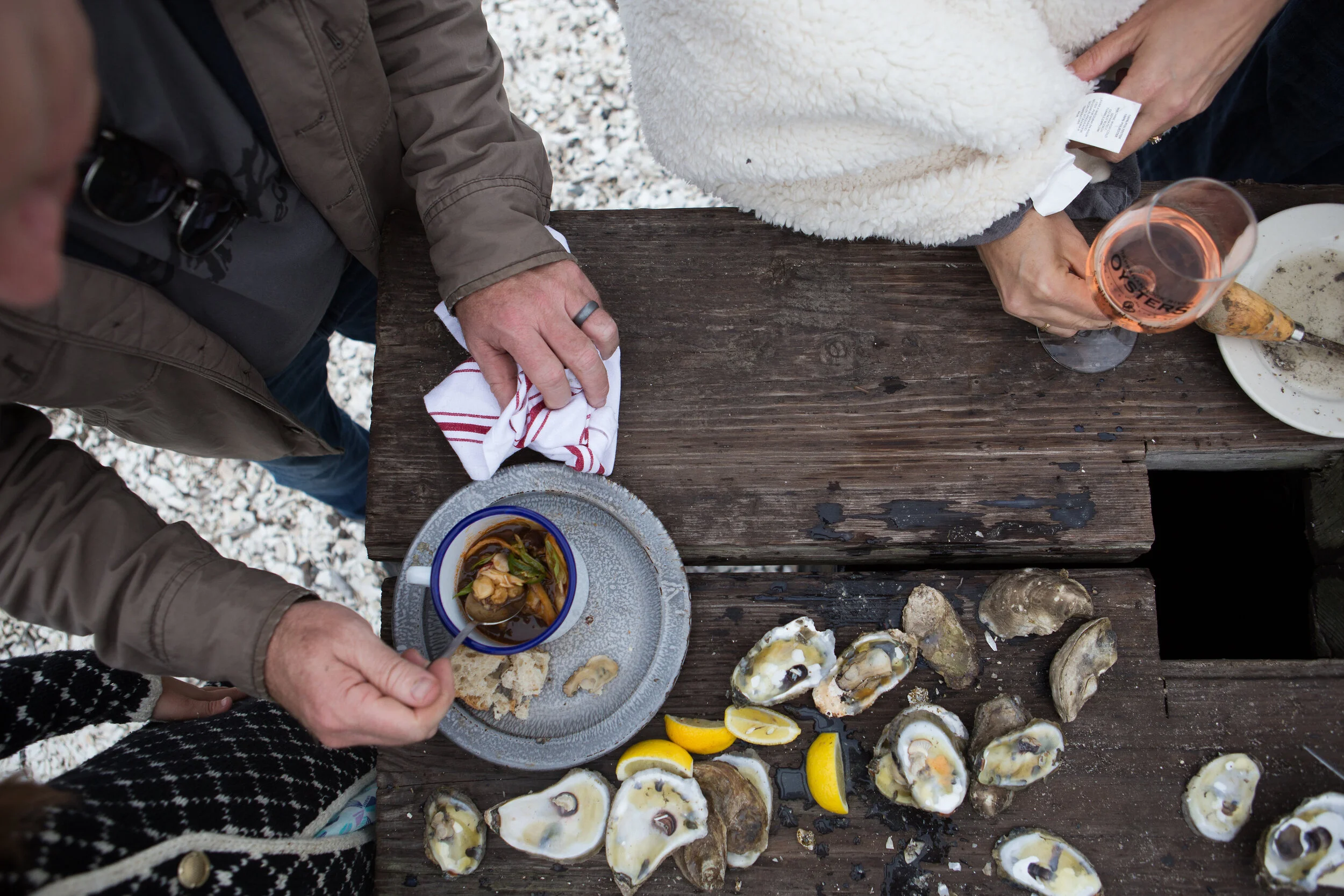It Takes a Village (of Farmers) to Make A Rake's Progress
/Chefs Gjerde and Crooks talk sourcing local
By AJ Dronkers, Photography by Jared Soares
DC locavores, whether foodies or artisans, awaited the opening of the new Line Hotel in Adams Morgan anxiously. The hotel was built to showcase the work of local makers all round, and the positive reception has proven the concept. Each of the rooms was individually curated with both furnishings and art. And that level of individuality was also given to the plan for food service: two restaurants by award-winning chefs, bringing together Chef Erik Bruner-Yang to open Brothers & Sisters and Chef Spike Gjerde and team from Baltimore’s Woodberry Kitchen, renowned for bringing sourcing local to the highest levels.
The Gjerde restaurant group, Foodshed, spent $2.1 million with local growers in 2016, a number that they estimate is to grow with their new operations. We sat down to talk with Chef Patrick “Opie” Crooks and Chef Spike Gjerde to hear more about their inspirations and how they are making it happen.
Edible DC: Before you opened, you held a “Growers Banquet” with all the farmers and producers that you source from here. Why was that evening important to your team.
Chef Opie: For us, it started years ago. Many of these growers are people we have been using since the beginning. For over 20 years we have had them in for dinner at Woodberry Kitchen, but never as a group. It was really important for us to start off this way—because the food we source from this group goes into banquets, employee dining, and our two restaurants at The Line Hotel, A Rake’s Progress and The Cup We All Race 4. And our commitment to local sourcing is how we wanted to kick things off in a very public way. The hotel has been really supportive of our experiments and loving things like our pickled beets.
Chef Spike: The cool thing was how much it meant for our team. I didn’t anticipate that. But the Growers Banquet generated this huge, positive energy—the hotel and lobby were full of farmers, families and their kids. The hotel felt radiant with their presence all night. For days and weeks after, people kept saying how special to them it was that they were there that night. We are feeding big groups of people via banquets with this all-local food. It’s challenge for us and not many people can do it. We had a tech company the night after the Growers Banquet and they had the same food and were very happy. We celebrated a proof of concept that actually works.
“This group has shared a table for many years at Woodberry Kitchen but never shared a table together. Rake team, meet your farmers; farmers, meet the team.” —Chef Spike at the Growers Banquet, a night celebrating all the farmers and producers before the restaurant opened.
Edible DC: From how many producers do you currently source? As you extend into a new regional area (DC) with new restaurants and a sizable operation, how did that change your sourcing and supply chain strategy?
Chef Opie: As of last year, we work with 156 farmers. We’ve gone deeper into Virginia. We were buying some stuff once a week that we now we need twice a week. We buy whatever they need to grow. Dead of winter is the roughest time. We work with co-ops since they can pull from many different sources to meet our demand. Two weeks ago I randomly got a hold of 10 dozen duck eggs. So within a day it had to be something with duck eggs on the menu; I came up with duck grits.
Chef Spike: Asparagus, rhubarb and ramps are bellwether for us; they really mark the shift in seasons. On a daily basis, Opie is adjusting and reacting to what’s available. April is frustrating because the world turns green but farms are still catching up.
Edible DC: When you buy what the farmers produce, instead of selectively picking fan favorites, how difficult is it to push patrons toward potentially unknown or unpopular produce?
Chef Opie: I try to sneak in stuff that people don’t know, sprinkle it in to support the farmer. Add rare leafy greens to mix of lettuce or use as a garnish. Heinz Thomet of Next Step Produce was out of the classic orange sweet potatoes but had a white one. People freaked out about this white sweet potato that actually originated here on the Eastern Shore. But on the menu, we’ll just say “sweet potato” to simplify and help sell what we get.
Chef Spike: The most compelling reason to get stuff on the menu is because a farmer grows it. What ends up on our menu is so connected to that—I will never stop thinking in those terms. There is absolutely an economic compulsion here—not just creative. Get it on the menu so we can sell more. Especially if a farmer comes to us with “I have a lot of this and it’s not selling at market,” that’s our call to action. Zach Lester of Tree & Leaf Farm had a lot of savoy cabbage and we came up with a dish to help him push through his supply. Takes a fair amount of communication between Chef Opie and farmers. Daily texts on what’s happening in the field and what he can use.
Edible DC: The menus offer daily updates from the farmers and notes about weather. Why is that important for you to share with your guests?
Chef Spike: The notes are a low-key way for us to start conversation. The farm lists at some restaurants seems so basic now and we wanted to go a step further.
Edible DC: Chef Spike’s philosophy has always been “local only”—how do you swap out things like limes, lemons and avocados for local produce?
Chef Spike: So far so good. If we are doing it right, we are giving people plenty to think about and try. We wow them with what we have and they don’t miss what we don’t have. The best defense is a good offense.
Edible DC: Any reactions/updates since you opened?
Chef Opie: We are going to do what we do. The implications of what we do go so much further than our table. We are returning value to our food system. If we get a bad critique about a specific item, I don’t take it off menu. The implication would be that all of that food from a farmer is trashed. We can tweak and react based on feedback but we don’t abandon this supply chain. The core of what we do is source local.
Chef Spike: There is no alternative from buying from local farms. The urgency in what we do is not speculative – it’s economic. We have to pay farmers for what they do or they can’t exist.
The Local Village of Farmers and Makers Who Supply a Rake's Progress include:
- 5 Seeds Farm
- Beilers Heritage Acres & Roam Dairy
- Berry Gal & Durgin Orchards
- Black Ankle Vineyards
- Butter Pat Industries
- Calvert's Gift
- Cottingham Farm
- Distillery Lane Ciderworks
- Eco Friendly Farms
- Falling Branch Brewery
- Foragers
- Gordy's Pickle Jar
- Great Wicomico/Cheasapeake Green Farms
- Jinji's Chocolates
- Karma Farm
- Keepwell Vinegar
- Lingenfelter Seafood
- Moon Valley Farm
- Next Step Produce
- Oak Spring Farm
- Old Westminster Winery
- One Straw Farm
- Orchard Point Oysters
- Pine Grove Farm
- Purple Mountain Organics
- Rettland Farm
- Sassafras Creek
- Shephards Manor Creamery
- Sunnnyside Farm
- Susquehanna Mills
- Three Springs Fruit Farm
- Two Boots Farm
- Villa Fungi
- Whistle Pig Hollow
- Woodberry Pantry





